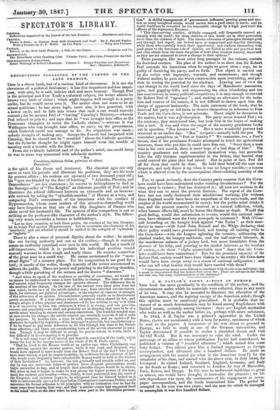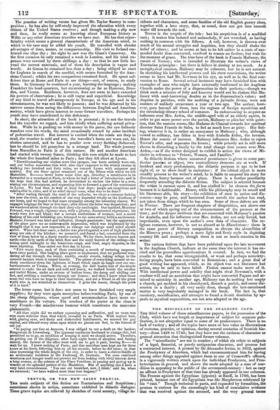J. B. TAYLOR'S VIEWS A-FOOT IN EUROPE.
Tins book has more peculiarity in the condition of the author, and the circumstances under which its materials were collected, than in any merit of its own. It may also be assumed to illustrate the education of the American masses, and the aspiring energy of the American mind ; though this opinion must be cautiously generalized. It is probable that in- stances of as much determination may be found among Englishmen with limited means, certainly among Germans : there are English mechanics who write as well as the author before us, perhaps with more substance.
In 1844, J. B. Taylor was a printers apprentice in the United States, (town not mentioned,) with a turn for poetry, specimens of which he sent to the papers. A connexion of his was about to proceed to Europe, we infer to study at one of the German universities, and Taylor determined if possible to realize a cherished dream and visit the Old World. But it was necessary to raise the wind. Under the patronage of an editor to whose publication Taylor had contributed, he published a volume of " youthful effusions " • which netted him some forty dollars. Two editors gave him a limited engagement as foreign correspondent, and advanced him a hundred dollars. He made an arrangement with his master (or what is the American term ?) for the remainder of his time, and started with the above sum, in July 1844, for Liverpool : he visited Ireland, Scotland, England, Germany, and Italy as far South as Rome ; and returned to London by way of Marseilles, Paris, Rouen, and Dieppe. In this tour he underwent hardships so great as almost, one world have thought, to neutralize the pleasure ; for his sole dependance was upon the continuance of his engagement as news- paper correspondent, and the funds transmitted him. The period he occupied in his tour was two years; the sum for which he managed to accomplish it was five hundred dollars. The practice of writing verses has given Mr. Taylor fluency in com- position' he has also by self-study improved the education which every citizen of the United States receives ; and though making a slip now and then, he really seems as knowing about European history as Willis or any other American traveller we have met. He has that super- ficiality which seems a general characteristic of the American mind, to which in his case may be added his youth. He travelled with slender advantages of time, means, or companionship. His visit to Ireland em- braced one clear day ; the sight he saw was the Giant's Causeway. On the first occasion he only remained a week in London, and his total ex- penses were covered by three shillings a day : so that he saw little be- yond the merest externals, and of them his description is vague and wordy. At Genoa he remained less than a day ; being obliged to start for Leghorn in search of the needful, with means furnished by the Ame- rican Consul; whilst his two companions remained fixed. He spent suf- ficient time at Rome and Paris to see things—not, of course, to study them. In Germany he continued a year, learning the language ; making Frankfort his head-quarters, but excursiouing as far as Hanover, Dres- den, and Vienna. Residence, however, does not seem to have extended his powers of observation ; he is still vague and superficial. Knowledge of any kind to travel advantageously in Europe, at his age and in his circumstances, he was not likely to possess ; and he was debarred by his narrow means from seeing the differences between English and American society, which have given interest to some former travellers. Perhaps his youth may have contributed to this deficiency.
In short, the attraction of the book is personal ; it is not the travels but the traveller we regard, and him chiefly when suffering actual priva- tion. While he is pushing on with money in his purse, the eye listlessly wanders over his words, the mind occasionally roused by some incident of pedestrian travel. But interest is excited when the roads are deep in mud, the weather is cold and wet, the traveller's boots are worn out, his clothes saturated, and he has to ponder over every farthing disbursed, lest he should be left pennyless in a strange land. The whole journey from Marseilles to Paris is of this nature. He and another American had started with twenty francs, thinking this sum might be made to last the whole five hundred miles to Paris ; but they fell short at Lyons.
"Notwithstanding our clothes were like sponges, our boots entirely worn out, and our bodies somewhat thin with nine days' exposure to the wintry storms in walking two hundred and forty miles, we entered Lyons with suspense and anxiety. But one franc apiece remained out of the fifteen with which we left Marseilles. B— wrote home some time ago, directing. a remittance to be forwarded to a merchant at Paris, to whom he had a letter of introduction; and in the hope that this had arrived, he determined to enclose the letter in a note, stating our circumstances, and requesting him to forward a part of the remittance to Lyons. We had then to wait at least four days: people are suspicious and mistrustful in cities, and if no relief should come, what was to be done? "After wading through the mud of the suburbs, we chose a common-looking inn near the river, as the comfort of our stay depended wholly on the kindness of our, hosts, and we hoped to find more sympathy among the labouring classes. We engaged lodgings for four or five days; after dinner the letter was despatched; and we wandered, about through the dark dirty city until night. Our landlord, Monsieur Ferrand, was a rough, vigorous man with a gloomy, discontented expression; his words were few and blunt; but a Certain restlessness of manner, and a secret flashing of his cold forbidding eye, betrayed to me some strong hidden excitement. Madame Ferrand was kind and talkative, though passionate: but the appearance of the place gave me an unfavourable impression, which was heightened by the thought that it was now impossible to change our lodgings until relief should arrive. When bed-time came, a ladder was placed against a sort of high platform along one side of the kitchen; we mounted, and found a bed, concealed from the view of those below by a dusty muslin curtain. We lay there, between heaven and earth—the dirty earth of the brick floor and the sooty heaven of the ceiling—lis- tening until midnight to the boisterous songs, and loud, angry disputes, in the room adjoining. Thus ended our first day in Lyons. " Five weary days, each of them containing a month of torturing suspense, have since passed. Our lodging-place grew so unpleasant, that we preferred wan- dering allday through the misty, muddy, smoky streets, taking refuge in the covered bazaars when it rained heavily. The gloom of everything around us en- tirely smothered down the lightness of heart which made us laugh over our em- barrassments at Vienna. When, at evening, the dull leaden hue of the clouds seemed to make the air dark and cold and heavy, we walked beside the swollen and turbid Rhone, under an avenue of leafless trees, the damp soil chilling our feet, and striking a numbness through our frames: and then I knew what those must feel who have no hope in their destitution, and not a friend in all the great world who is not wretched as themselves. I prize the lesson, though the price of it is hard."
The letter came, but it does not seem to have furnished very ample supplies ; for they were again moneyless before reaching Paris, by one of the cheap diligences, whose speed and accommodation have more re- semblance to the voiture. The conduct of the porter at the close is very French—the mischievous humour which constitutes the mauvaise plausanterie.
All that night did we endure squeezing and suffocation, and no morn was ever more welcome than that which revealed to us Paris. With matted hair, wild, glaring eyes, and dusty and dishevelled habiliments, we entered the gay capital, and blessed every stone upon which we placed our feet, in the fulness of our joy. "In paying our fare at Auxerre, I was obliged to use a draft on the banker, Rougemont de Liiwenberg. The ignorant conductor hesitated to change this, but permitted us to go, on condition of keeping it until we should arrive. Therefore, on getting out of the diligence, after forty-eight hours of sleepless and fasting misery, the facteur of the office went with me to get it paid, leaving B— to wait for us. I knew nothing of Paris; and this merciless man kept me for three hours at his heels, following him on all his errands, before he did mine; in that time traversing the whole length of the city, in order to leave a chevre-fenille at an aristocratic residence in the Faubourg St. Germain. Yet even combined weariness and hunger could not prevent me from looking with vivid interest down a long avenue, at the column of the Place Vendipme, in passing and gazing up in wonder at the splendid portico of the Madeleine. But of anything else I have a very faint remembrance, ' Yon can eat breakfast, now, I think,' said he, when we returned; we have walked more than four leagues "



































 Previous page
Previous page